The answer may at first sight seem to be that he primarily desires pleasure, and so is willing to continue on that battlefield where it wages war with pain for the possession of him, hoping always that pleasure will win the victory and take him home to herself. This is but the external aspect of the man’s state. In himself he knows well that pain is co-ruler with pleasure, and that though the war wages always it never will be won. The superficial observer concludes that man submits to the inevitable. But that is a fallacy not worthy of discussion. A little serious thought shows us that man does not exist at all except by exercise of his positive qualities; it is but logical to suppose that he chooses the state he will live in by the exercise of those same qualities.
Granted, then, for the sake of our argument, that he desires pain, why is it that he desires anything so annoying to himself?
II
If we carefully consider the constitution of man and its tendencies, it would seem as if there were two definite directions in which he grows. He is like a tree which strikes its roots into the ground while it throws up young branches towards the heavens. These two lines which go outward from the central personal point are to him clear, definite, and intelligible. He calls one good and the other evil. But man is not, according to any analogy, observation, or experience, a straight line. Would that he were, and that life, or progress, or development, or whatever we choose to call it, meant merely following one straight road or another, as the religionists pretend it does. The whole question, the mighty problem, would be very easily solved then. But it is not so easy to go to hell as preachers declare it to be. It is as hard a task as to find one’s way to the Golden Gate! A man may wreck himself utterly in sense-pleasure,—may debase his whole nature, as it seems,—yet he fails of becoming the perfect devil, for there is still the spark of divine light within him. He tries to choose the broad road which leads to destruction, and enters bravely on his headlong career. But very soon he is checked and startled by some unthought-of tendency in himself,—some of the many other radiations which go forth from his centre of self. He suffers as the body suffers when it develops monstrosities which impede its healthy action. He has created pain, and encountered his own creation. It may seem as if this argument is difficult of application with regard to physical pain. Not so, if man is regarded from a loftier standpoint than that we generally occupy. If he is looked upon as a powerful consciousness which forms its external manifestations according to its desires, then it is evident that physical pain results from deformity in those desires. No doubt it will appear to many minds that this conception of man is too gratuitous, and involves too large a mental leap into unknown places where proof is unobtainable.




